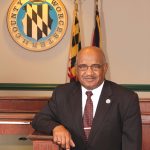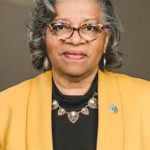By Ally Lanasa, Staff Writer
(Dec. 10, 2020) James “Jim” Lee Purnell Jr. celebrated the 25th anniversary of becoming the first Black Worcester County Commissioner last Thursday.

James Lee Purnell Jr.
“I didn’t do it for money because we got no money,” Purnell said. “I wanted to see a change, and those changes we were able to get.”
Born in 1937 to Hulda and James L. Purnell Sr., Purnell grew up on the family’s dairy farm in Briddletown.
“I knew what we went through as a people,” Purnell said.
From a young age, he witnessed racism in Berlin and Worcester County that motivated him to become involved in social activism.
“I looked at my mother to go uptown to get a bus ticket to go to Philadelphia, but she couldn’t stay inside and receive the ticket,” Purnell said. “She had to go outside, then the person would bring the ticket out to her.”
He shared another account of being restricted entry to certain places in Berlin because of the color of his skin.
“My sister was hit in the stomach with a blackjack [weapon] at 7 years old for just standing on the corner of the street while my mother was inside paying for her shoes to wear,” Purnell said. “My father eventually got that police officer fired off the job.”
He also experienced discrimination in public schools, which were segregated throughout the state at the time.
“Worcester County had two education systems – one for Blacks and one for Whites,” said Gregory Purnell, his nephew, Briddletown resident and local historian.
Purnell walked miles from his home to Flower Street Elementary School, which is now a multipurpose building, every day on the dirt road in all kinds of weather.
When he attended Worcester High in Snow Hill, he would ride a bus with his peers.
Gregory added that the Worcester County Public Schools were segregated, including teachers, until 1965 when the first Black student attended Stephen Decatur High School.
“It wasn’t until 1970 that full integration took place,” Gregory said.
According to a 1995 article by The Daily Times, Purnell began working at 16 at Sunshine Laundry in 1953 when Berlin and most of the country were segregated. He was the first Black person the laundry store ever hired. Forty-two years later, he broke another racial barrier by joining the Worcester County Commissioners.
Long before he became an elected official, Purnell married his wife of over 60 years, Clementh, and worked as a long-distance truck driver, hauling chickens for local poultry producers, until 1970.
He attended drapery trade school in Pennsylvania and opened a drapery business in Worcester County in 1971.
Purnell went on to become a school bus contractor for almost 45 years in addition to driving a charter bus.
Purnell began his social justice work on Maryland’s lower Eastern Shore in the 1980s when he became involved with the local branch of the National Association for the Advancement of Colored People (NAACP).
“He started to challenge all types of things in Worcester County, in Berlin and in Ocean City,” Gregory said. “It started back in like ’82-’83 back in that time when they were challenging the attempts to stop students from observing Martin Luther King’s birthday. That had been called a school day.”
During the 1980s, Briddletown’s landfill problems created concerns about contamination in the lower aquifer that supplied wells and drinking water, according to an article from The Baltimore Sun on Feb. 12, 1986.
Without a landfill or solid-waste disposal in Ocean City, the prosperity of the resort brought a health threat to the Black community.
“It caused a horrible odor and was contaminating the water for Briddletown,” said Alec Staley, a local historian librarian for the Worcester County Library. “It was originally supposed to have been closed in 1986 but did not actually close until 1989-1990 when a new landfill was opened in Newark. It did not close on time, most likely because it was in a minority community and the county felt it would be too much money to move.”
Purnell had a personal mission to move the landfill because his mother’s house was directly behind it, Staley added.
“In 1986, he became the president of the Worcester County NAACP,” Staley said.
Purnell said he served as president of the NAACP for about 10 years.
He participated in a march on the Ocean City Boardwalk for better jobs for minority groups on the resort.
“He also led the fight in the ’90s to establish a minority district and won that fight,” Staley said. “He started the fight around 1992 and won it.”
Purnell and other African Americans claimed the at-large system in Worcester County excluded them from office.
“During that time, me and a group of people saw fit to challenge the election system here in this county, whereby we wanted to make it district voting so we could elect the person of our choice,” Purnell said.
Purnell was involved in a lawsuit against Worcester County that the county fought up to the Supreme Court.
“Supreme Court did not hear the case, so that meant we won the case because they agreed with what we were saying,” he said.
From there, the minority district was created to give Blacks and other minorities a chance at elected office.
“We were paying taxes, but we weren’t being represented,” Purnell said. “We had to go change the election system.”
The election for Worcester County Commissioners was delayed a full year because of the prolonged court battle about voting rights, according to a Washington Post article from Nov. 4, 1995.
“I lived in a minority district,” Purnell said. “I was asked to run in that minority district.” Purnell added that at the time he had no intention of being a politician because he was already chairman of the Worcester County branch of NAACP and vice president of the NAACP in the state of Maryland.
On Nov. 7, 1995, Purnell was elected the first Black Worcester County Commissioner in the history of the county. He officially took office on Dec. 3, 1995.
“The biggest challenge that I had was being able to sit down to the table and lay out our differences with both Blacks and Whites working together,” Purnell said. “We made a lot of progress in doing that. It wasn’t easy, but at least they saw that we were sincere about what we were doing [and] what we wanted to do.”
Purnell also became the first Black president of the Worcester County Commissioners.
He served on the board until 2014, when he did not seek re-election.
“In those 20 years, a lot of things changed, not only for Blacks, but for this whole county,” Purnell said.
Purnell is proud of his collaboration with his fellow commissioners, especially those that fought him in the lawsuit.
“Once I was elected, we were able to work together on different issues,” he said. “They supported me.”
Since Purnell’s retirement, Diana Purnell is the only other African American elected to the Worcester County Commissioners. She represents the minority district today.
Diana was then elected to serve as the president of the Worcester County Commissioners in 2017 and in 2018.

Diana Purnell
She is also active in the Worcester County Branch of the NAACP.
Diana has known James Purnell for at least 40 years, adding that he, she, her husband, Gabe Purnell, and others worked as community organizers in their district and in the county.
“Once we got that court settlement, where they had to draw a district, it was the opinion of the group that filed that case that Jim would be the person that would be most suitable to go in as the commissioner, and he did,” she said. “He always made sure that he would appoint someone that would represent the community, and Jim appointed me to a lot of different commissions.”
In addition to his political career, former Commissioner Purnell is a past state grand master of Odd Fellows of Maryland, a former worshipful master of the Prince Hall Freemasons and a member of Blue Lodge. He is also heavily involved in St. Paul’s United Methodist Church in Berlin.
In 2017, he published an autobiography about his race-related experiences in the county, “James Lee Purnell Jr.: Memories of Struggles and Progress in a Segregated Worcester County, Maryland,” with Kimberly A. Chase.
“I just want to be remembered as James Purnell, born, raised [and] grew up in this community, and a person that gave of himself to make a difference in this community along with support that I got from the community and from the county as well as from the state,” Purnell said.
He also hopes the county remembers his support for local children.
